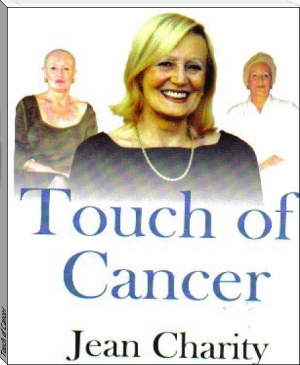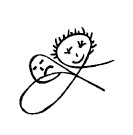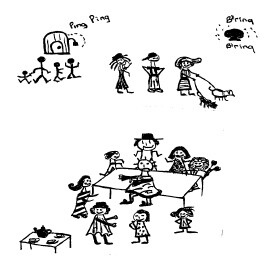Touch of Cancer, Jean Charity [most inspirational books txt] 📗

- Author: Jean Charity
Book online «Touch of Cancer, Jean Charity [most inspirational books txt] 📗». Author Jean Charity
A TOUCH OF CANCER
Jean Charity
To Buy visit www.jeancharity.com

A light but factual look at the side-effects of cancer
treatment through the eyes of a CRP (cancer remission patient)
The Black Leaf Publishing Group
www.blackleafpublishing.com
Copyright © 2009 The Black Leaf Publishing Group
The right of Jean Charity to be identified as the Author of the Work has been asserted by her in accordance with the Copyright, Designs and Patents Act 1988
All rights reserved
The author and the publisher have not knowingly infringed any copyright however should this not be the case, please contact the author via the publisher and an acknowledgement will be gladly placed in all future copies of this book.
No part of this publication may only be reproduced, stored in a retrieval system or transmitted, in any form, or by any means, without prior permission in writing from the publishers or, in the case of reprographic production, in accordance with the terms of licences issued by the Copyright Licensing Agency.
No part of this publication may be circulated in any form of binding or cover other than that in which it is published and without a similar condition being imposed on the subsequent purchaser
All characters in this publication are thought to be fictional and any resemblance to real persons, living or dead, is purely coincidental.
ISBN 978-1-907407-00-0
THE BLACK LEAF PUBLISHING GROUP
83 Clipstone Rd West
Forest Town, Mansfield
NG190ED
Nottinghamshire
England
www.blackleafpublishing.com
For my friend, Sharon, who is fighting her own battle in Australia
and who, despite the many miles between us,
has lightened my days with her humour and understanding.
Thank you Sharon
The proceeds from the sales of this book are to be paid to
Cancer Research in the UK /USA
(Cancer Research UK registered No. 400265600)
CONTENTS
Acknowledgements
Foreword
Introduction
1 Friends and family
2 Drugs and decisions
3 Anti-social issues
4 Other adverse effects
5 Hair
6 Sex
7 Smoking
8 Faith
9 Mood swings and confidence
10 Attitude and tributes
Finale
ACKNOWLEDGEMENTS
To the wonderful Clinica Rotger for affording me all the latest in
medical know-how; for their professionalism; for their unwavering
attention and always-smiling faces – and for most of all making me
feel like ‘family’.
To the brilliant Dr José Antich Rojas
and his team for their dedication, care; and sheer determination to
prolong my life!
To my Surgeon and friend Mr Guy Clendinnon for his huge
contribution to my being here now; his prompt action; his concern and
attention – and for making me laugh!
To the eminent Professor Geoffrey H. Smith for his invaluable help,
advice, constructive opinions and explanations – but most of all for
just ‘being there’ for me.
To my Doctor – Dr Ian Marshall of the British Medical Team for his
initial persistence and diligence.
To the friends who have cared about me enough to excuse and respect
my attempts at self-imposed isolation.
And to all those fantastic caring people out there who never give up;
never stop fighting, or searching for new ways to fight this disease.
To all of them I can only say a very inadequate:
THANK YOU
THANK YOU – SO VERY, VERY MUCH
FOREWORD
Amongst all the books written on Cancer I have never seen one covering the more delicate issues of some of the side effects which can cause more distress to the patient than the actual Cancer itself. Nor, when I was diagnosed, did anyone warn me of such effects.
The onslaught on my body I was prepared for to a degree, but the changes in my attitude and personality, together with the many little humiliations and embarrassments which arose, were totally unexpected.
In writing of my personal experiences I have brought out some of the issues normally not considered quite socially acceptable for discussion, in the hope that it will give a little peace of mind to those of you who share similar concerns.
In those moments when you feel no-one understands you, and fear that you are walking a very lonely road, I hope you will pick this up and gain a little comfort from realising that you are not alone after all.
You are understood – and in good company.
ENJOY
INTRODUCTION
A little about the Author:
I am 65 years of age, female, divorced, and living alone in Spain to where I moved following the death of my dogs, two Maltese bitches Trudie & Caisha, who were the loves of my life.
I had been in Spain barely two years before I was diagnosed with Non-Hodgkins Lymphoma and was by then at a very advanced level (Stage IV) having tumours from the neck down to mid-calf, and infection in the bone marrow. The fact that I have survived this long
never ceases to amaze me.
I have no idea how or when I contracted this disease but of the original symptoms I took little notice: hair loss - the reason for which I could not fathom; diarrhoea, which I put down to changes in climatic and dietary conditions; itching at night to which I attributed the heat plus possibly the invasion of weird and wonderful insects my apartment may have been harbouring, and severe fatigue. The latter I was convinced was due to staying out partying most of the night at my somewhat advanced age.
Once one is suffering from an affliction it is amazing how one suddenly becomes aware of others fighting similar battles, and it was comments made by two other Cancer patients which prompted me to write this. Their remarks made me realise that a lot of what we have to endure is simply not talked about. We keep certain things to ourselves and this can cause us to fret. I felt if these things were brought out into the open they would cease to be such a cause for concern; and so the following is a quite brutally frank presentation of how it really is – my aim being that in sharing experiences openly it may be possible to look at the varying situations which plague us in a more light-hearted manner, rather than with feelings of shame and solitude.
Also instrumental in my putting this together was a young man of 17 years of age at the time who, during his Remission, would regularly interrupt social conversations to say: ‘It’s no fun having Cancer you know’ reminding his family and friends not only of what he had gone through, but what he was still going through. His ‘audience’ thought his comments very odd, but I thought I understood what he was trying to convey, and I empathised with him. No healthy person can possibly understand, to the full extent, how we are feeling, and whilst our bodies may heal, the scars and fears we carry remain inside.
We all have to cope with this disease in our own individual way, and whilst they can offer support, no-one can tell us how to do it. We are on our own in this. But whatever the outcome for me I have learnt much because of it, and am still learning. It has changed me. I believe I, personally, needed to stand still, take stock, and alter my outlook. The lessons I have learnt so far were long overdue, and I hope will have resulted in my being a much better and more understanding person than before.
The writing is ‘chapterised’ to enable anyone to pick out at random an issue which may be causing concern; and hopefully to realise that there are millions of us quietly coping with the same issues.
1
FRIENDS AND FAMILY

Other people, sadly, were my biggest bone-of-contention during the early treatments, causing me untold hassle. Unfortunately I had no one at my side to ward off the well-wishers; the curious; or the simply lonely who wanted to share in my ‘Moment of Glory’. Being of a very independent and stubborn nature I don’t find it easy to either accept or ask for help, preferring to shut myself off from the world when I have a problem and emerge back into it when I’m ready. The attention my condition initially attracted made me feel extremely vulnerable – like a bird of prey – and I have to admit to strong feelings of resentment at times. Especially when visitors called and my head was stuck down the lavatory pan, or I was lying prostrate and pallid in my own apathy, or the telephone ringing aroused me from a lovely deep sleep. I know their intentions were, in the main, good; but if I didn’t respond to their calls or their rings they thought I was dead! This added to my concerns.
So many people wanted to see me, but rather than feeling grateful, I questioned. Did they really want to see me or did some of them merely want to ‘have a look’ at me? There is a big difference and I could sense the scrutiny of some, making me feel rather like a freak in a circus. In short, unwittingly and with good intent, they drove me mad, and although I should have felt warmed by their concern, it had the opposite effect of making me fear the disturbance to my rest would adversely affect the progression of the drugs.
I had wanted to keep my condition to myself as long as possible and the handful of people in whom I confided promised discretion: ‘You can trust me. I won’t say a word’. But the news travelled, and I came to the obvious conclusion that supermarket trolleys and counters in local bars are not simply inanimate objects after all. They have a lot to answer for. It was totally ungracious of me to finally tell people to leave me alone; but hey, I was (and still am) fighting for my life here, and soon found consolation in telling myself I was ‘allowed’ to be selfish under the circumstances. I am still telling myself that!
From being a very gregarious and outgoing party-person, I have now become very selective about the company I keep, preferring a drink, meal, or simply a chat, with a few close friends with whom I can really relax and feel at ease. These friends are invaluable to me, and the times I share with them give me untold joy.
If I need to defend myself in any way regarding this I would simply call it self-preservation.
At the other extreme there are friends who, once your news is out, neither telephone nor contact you again. I can understand these people. What can they say? What can they do? For some, cancer is a stigma in a similar way to AIDS and the very word can strike a chill in the bones. Some are scared of seeing the happy healthy person of before deteriorate in front of their eyes. Some are scared the disease may rub off on them in some way. Some are scared of the mortality it forces them to acknowledge. Some have seen it all before and can’t bear the memories being dragged to the surface; and some are so close to the person concerned that they





Comments (0)